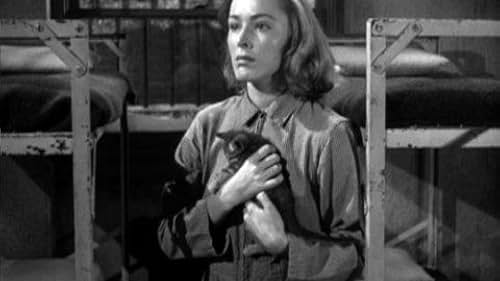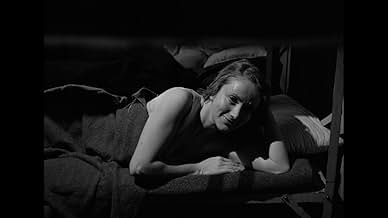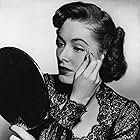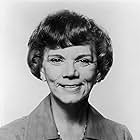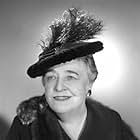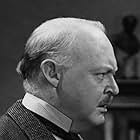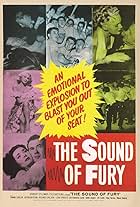A gentle, naive, pregnant 19-year-old widow is slowly, inexorably ground down by the hardened criminals, sadistic guards, and matron at a woman's prison. Will she be the same person when her... Read allA gentle, naive, pregnant 19-year-old widow is slowly, inexorably ground down by the hardened criminals, sadistic guards, and matron at a woman's prison. Will she be the same person when her sentence is up?A gentle, naive, pregnant 19-year-old widow is slowly, inexorably ground down by the hardened criminals, sadistic guards, and matron at a woman's prison. Will she be the same person when her sentence is up?
- Nominated for 3 Oscars
- 1 win & 5 nominations total
Sheila MacRae
- Helen
- (as Sheila Stevens)
Gertrude Astor
- Inmate
- (uncredited)
George Baxter
- Jeffries
- (uncredited)
Guy Beach
- Mr. Cooper
- (uncredited)
Don Beddoe
- Commissioner Sam Walker
- (uncredited)
Gail Bonney
- Inmate
- (uncredited)
Lovyss Bradley
- Inmate
- (uncredited)
Ralph Brooks
- Man in Car
- (uncredited)
Storyline
Did you know
- TriviaAfter I Am a Fugitive from a Chain Gang (1932) led to prison reform in six states, Warners producer Jerry Wald wanted to do the same for women's prisons and sent former newspaper reporter Virginia Kellogg out. She had written a novel that became a Kay Francis film, Mary Stevens, M.D. (1933), about a doctor who bears a child out of wedlock. She had also written well-researched original stories that were the basis for T-Men (1947), about treasury agents, and White Heat (1949), starring James Cagney as a psychotic gangster. She spent months doing research for Caged (1950) at prisons around the country, and was even briefly incarcerated in one of them. Her research is evident in the script with authentic prison slang of the era, and details of prison life, such as the caste system, and the tedium of daily life. Virginia Kellogg and Bernard C. Schoenfeld received an Oscar® nomination for Caged (1950)'s story and screenplay.
- GoofsAn inmate, Georgia Harrison, gets hysterical and breaks the window in her corridor. In this case, the window was inside the bars, which is why the glass would be in a protected and unreachable position. Instead, the bars would have been placed first inside, then the glass further away. The glass would probably be re-enforced glass with wire or even safety glass. Otherwise, an inmate could do just what Georgia did, break it. Then pieces of the glass could be used against other inmates or even prison employees. But then if the glass was safety glass, the scene with Georgia breaking the window would not have been quite so dramatic.
- Quotes
Helen: [referring to a newly paroled Marie Allen] What shall I do with her file?
Ruth Benton: Keep it active. She'll be back.
- ConnectionsEdited into House of Women (1962)
Featured review
"Caged" is the rare kind of movie that works both as a film to take seriously and as a camp classic.
Eleanor Parker plays Marie Allen, a naive 19-year-old who goes to prison as an accomplice in an armed robbery staged by her loser husband. She doesn't really belong there, but despite the efforts of the prison administrator (Agnes Moorehead) to help her get paroled, she remains locked up, only to be turned into a jaded criminal by the very institution that's supposed to reform her.
The film is full of rough stuff, atrocities and indignities heaped one after another on Marie or the other inmates. Women are beaten, subjected to psychological abuse, thrown into solitary confinement. Their heads are shaved, they have babies who they're forced to give up for adoption. One woman freaks out and breaks a window with her bare hands, and we see the blood spurting from her severed arteries. Another woman hangs herself. Presiding over all is sadistic warden Evelyn Harper, played memorably by the gigantic actress Hope Emerson, who abuses her power so egregiously that she eventually gets stabbed in the chest with a fork by one crazy inmate while Parker's character hisses "Kill her! Kill her!"
The screenplay tosses out one memorable line after another -- my favorite is Parker's departing words to Moorehead when Marie finally gets her parole: "Thanks for the haircut." But for all the women-behind-bars sensationalism, the film is no joke. It's well directed by John Cromwell, who clearly wanted to make a serious indictment of a flawed system, and if it's lurid, it's also effective. I laughed a lot, but I also found myself outraged.
In addition to Parker, Emerson (both Oscar nominated, by the way) and Moorehead, the cast also includes Jan Sterling and Betty Garde as two of the more memorable inmates.
Grade: A
Eleanor Parker plays Marie Allen, a naive 19-year-old who goes to prison as an accomplice in an armed robbery staged by her loser husband. She doesn't really belong there, but despite the efforts of the prison administrator (Agnes Moorehead) to help her get paroled, she remains locked up, only to be turned into a jaded criminal by the very institution that's supposed to reform her.
The film is full of rough stuff, atrocities and indignities heaped one after another on Marie or the other inmates. Women are beaten, subjected to psychological abuse, thrown into solitary confinement. Their heads are shaved, they have babies who they're forced to give up for adoption. One woman freaks out and breaks a window with her bare hands, and we see the blood spurting from her severed arteries. Another woman hangs herself. Presiding over all is sadistic warden Evelyn Harper, played memorably by the gigantic actress Hope Emerson, who abuses her power so egregiously that she eventually gets stabbed in the chest with a fork by one crazy inmate while Parker's character hisses "Kill her! Kill her!"
The screenplay tosses out one memorable line after another -- my favorite is Parker's departing words to Moorehead when Marie finally gets her parole: "Thanks for the haircut." But for all the women-behind-bars sensationalism, the film is no joke. It's well directed by John Cromwell, who clearly wanted to make a serious indictment of a flawed system, and if it's lurid, it's also effective. I laughed a lot, but I also found myself outraged.
In addition to Parker, Emerson (both Oscar nominated, by the way) and Moorehead, the cast also includes Jan Sterling and Betty Garde as two of the more memorable inmates.
Grade: A
- evanston_dad
- Oct 7, 2009
- Permalink
Details
- Runtime1 hour 37 minutes
- Color
- Aspect ratio
- 1.37 : 1
Contribute to this page
Suggest an edit or add missing content


